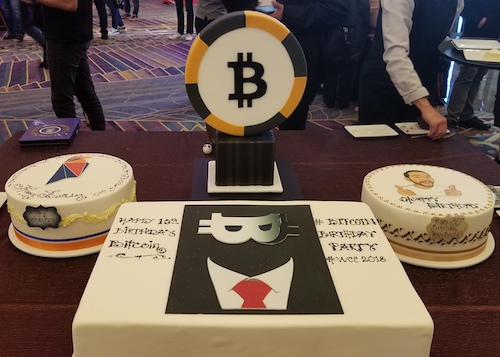In honor of the bitcoin white paper‘s 10th anniversary, we took a long look at Satoshi’s legacy. From the man who claimed the author’s identity to early developers who helped make bitcoin what it is today—to examinations of what it even is today—here’s what you need to know about bitcoin since its emergence on October 31, 2008. We’ve rounded up everything we and other news outlets wrote to honor bitcoin’s first ten years, so you don’t have to search the web for information like you’re digging for Satoshi Nakamoto’s true identity.

Bitcoin white paper stories from BREAKER:
Early bitcoin developer Jeff Garzik, now the CEO of Bloq, reflects on his early encounters with bitcoin.
Blockchain “rebels”—Jeffrey Tucker, editorial director, American Institute for Economic Research; Elizabeth McCauley, Bitcoin Foundation board; Erik Voorhees CEO, ShapeShift.io; and Jameson Lopp, cypherpunk, op-sec champion—say what first excited them about the white paper and what they think the future of bitcoin has to hold.
We break down all the major pop culture moments in crypto, starting in 2011 with the “Bitcoin rap” by mc bitcoin.
We follow the investigators who desperately sought Satoshi, tracking their journeys from a Santa Barbara crypto conference in 2011 to an international jaunt with Craig Wright in 2016 and a vaguely answered CIA query earlier this year.
Four founders and developers—Dogecoin creator Jackson Palmer, BitPesa founder Elizabeth Rossiello, co-founder and former COO of Monax Preston Byrne, and Bloq co-founder/bitcoin core developer Jeff Garzik—discuss bitcoin’s fulfilled promises and notable failures.
BREAKER writer Brian Patrick Eha shares an excerpt from his book on bitcoin’s early days and evolution, How Money Got Free, published in 2017.
“Do you think you’ll go down in the history books like Thomas Edison?” BREAKER’s Mark Yarm asks Craig Wright in an interview spanning topics like how the internet is “socialist,” bitcoin is “capitalist,” and Wright is “winning quite well.” “If I stop now, I’ll get to be the third most-prolific inventor, by patents, in human history,” replies Wright. “So yes.”
Economics writer JP Koning compares bitcoin to “the more speculative products provided by Wall Street.”
A history of sensationalist bitcoin headlines shows just how many times bitcoin has been pronounced dead and revived, “like a majestic, digital phoenix that just wants to one day be reborn into a world where currency isn’t subject to government regulation and people can pay their friends back for lunch without a centralized intermediary.”
We break down the bitcoin white paper thoroughly, explaining Satoshi’s probable intentions in terms that even non-cryptographers can understand.
What kind of dough would you have now if you didn’t use bitcoin to buy 3.5 grams of weed on the Silk Road in February 2011? This interactive graphic will help you calculate all kinds of missed opportunities.
Bitcoin mining takes a lot of energy. Here’s just how much energy it takes, and what that figure means for the world.
Investors, futurists, and policy experts—Neeraj Agrawal, director of communications at CoinCenter; Jalak Jobanputra, founder, FuturePerfect Ventures; Jimmy Song, developer, educator, investor, hat-wearer; Primavera di Filippi, co-author, Blockchain and the Law: The Rule of Code; Nic Carter, public blockchain investor at Castle Island Ventures—speculate about bitcoin’s future.
And from elsewhere on the web…
Coindesk gathers cypherpunks and C-suite execs to talk about the past, present, and future of bitcoin.
Here’s a compelling alternative to Craig Wright as Satoshi: Fortune makes the case for Nick Szabo.
Paul Vigna, co-author of The Truth Machine: The Blockchain and the Future of Everything, goes in-depth on the life and times of bitcoin, for The Wall Street Journal.
Wired, which has been following bitcoin since its early days, examines how much the first blockchain-based currency has really changed in the past decade.
JP Morgan’s CEO doesn’t “really give a shit” about bitcoin on its 10th birthday, writes The Verge. 🙁
CNBC relives the day it reported on bitcoin’s price first hitting $100 in the spring of 2013.
What has bitcoin really accomplished? Is it that revolutionary? Does society trust centralized institutions even more than we may have realized? Quartz asks the questions that bitcoin provokes.
The Block lists ten surprising facts about the original bitcoin white paper.
Laura Shin reflects on the white paper with two other blockchain journalists, Vigna and New York Times writer Nathaniel Popper.
